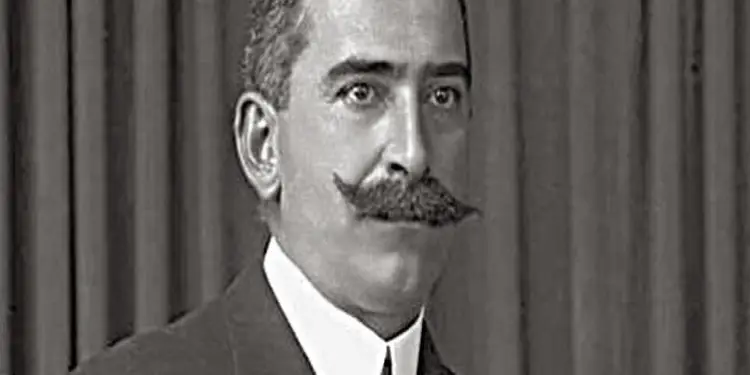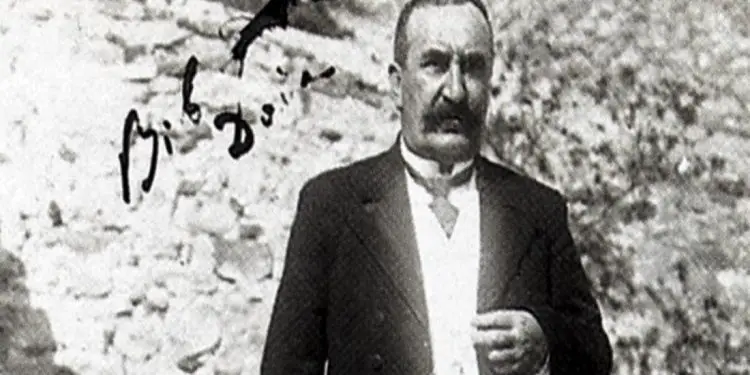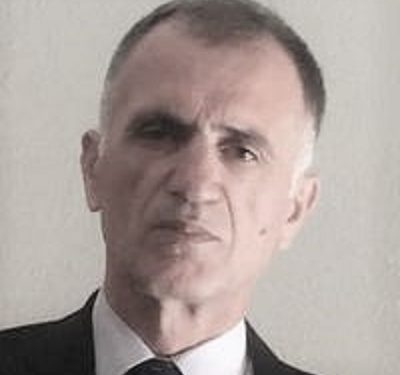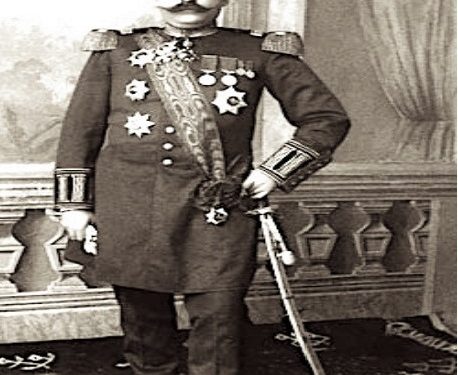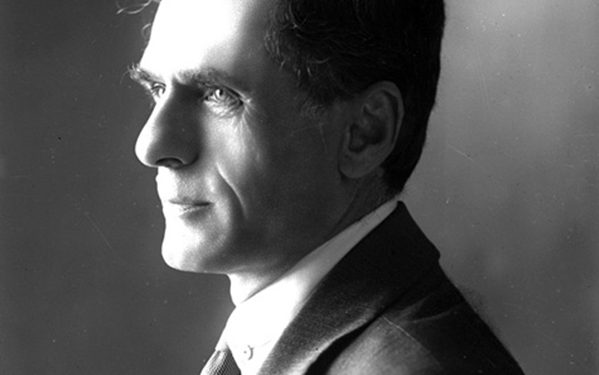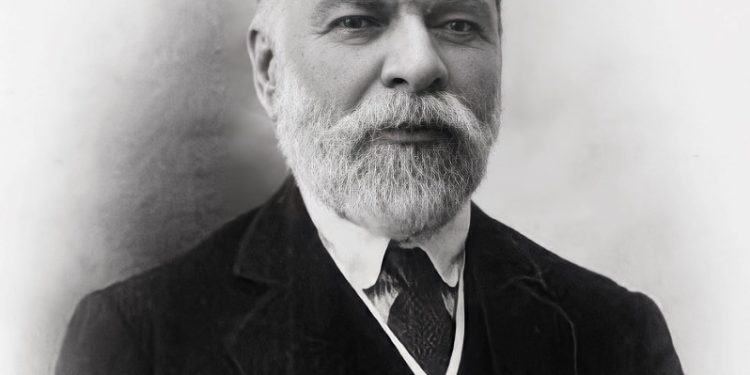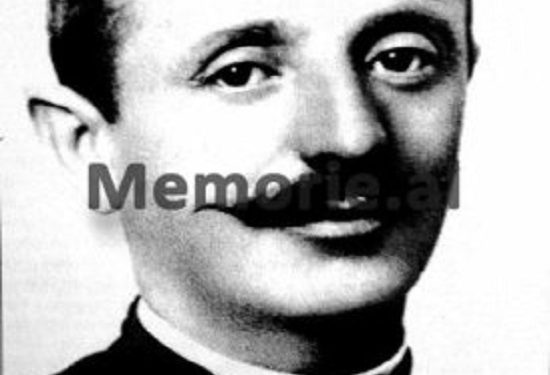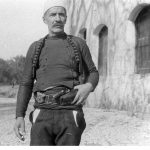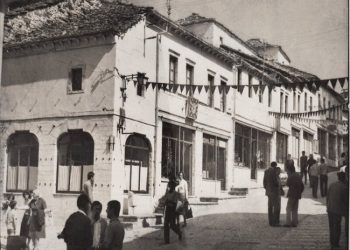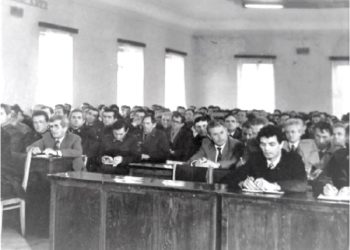By Dr. Nikol Loka
Part twenty-two
“PRENGA BIBE DODA, THE SHADOWS OF A CITIZENSHIP”
Memorie.al / The newest book “Prengë Bibë Doda, a phenomenon in Albanian political life”, by researcher Nikollë Loka, not only expands the scope of historical studies on Mirdita, the Door of Gjonmarkaj and the figure of the Mirdita Prince, Prengë Bibë Doda, but it is also a contribution to national historiography. The very rich archival material, the literature used or consulted, oral traditions, etc., make this book a real study treasure, giving the science of history a scientific monograph that enriches our knowledge of Mirdita, its captains, tradition, history etc. Studying such an important and complex figure, such as the figure of Prengë Biba Doda, is a high scientific responsibility that not everyone undertakes. Nikollë Loka, has done a great job of research and treatment by the professional researcher, giving us the portrait of the Prince and the general Mirditor, with the true contours. Dr. Loka has adhered to the end of the space and time, in which the multidimensional events and their protagonists have developed.
THE MONOGRAPH “ABOUT BIBË DODA, A PHENOMENON IN ALBANIAN POLITICAL LIFE”, A VALUABLE SCIENTIFIC STUDY THAT ENRICHS THE FUND OF OUR HISTORICAL STUDIES
(By Mr. Sc. Murat Ajvazi, March 2017, Switzerland)
Continues from last issue
The document reveals that the Chief of the Mirditas had asked for subsidies and that he “may throw himself into the arms of another country”, alluding not only to France, but also to Italy. Austro-Hungarian diplomacy came to the conclusion that; “Kreu mirditas has to rush very quickly, to take advantage of the Austro-Italian rivalry. The favoritism on the part of Italy would cause the rise of his reputation, damaged since the period of removal of our subsidy, and would again put him against the unification of the country”. (439)
Having competing interests with Vienna, Rome was interested in Prengë Bibë Doda working against the Austro-Hungarian policy, because in that way he was valuable to her policy. However, Rome sought to reconcile its own interests with Prenga’s ambitions, not seeing his actions as harmful to Italy. In fact, the Italian position goes as far as accepting the “Catholic Principality under the protection of Serbia” option. (440)
In order to win the Leader of the Mirditas behind her policy, Rome requested that he become part of the government cabinet. According to Marquis San Giuliano, “taking Prengë Bibë Doda into the government is meant to make him harmless. His character and the influence he has are not enough to make him good, but as an unhappy person, he can gather around himself other unhappy people and create disturbances. (441)
The second wrong position of Prenga is related to the beginning of the Balkan war, when after the fighting in Lume, the Serbs talked with Prenga Bibë Doda, who accepted that the Serbian forces, which were chasing the Turkish forces, could freely pass through Mirdita. This favor that was given to the Serbs had consequences, because the Albanian territories were at stake and the defeated Turks were thinking of retreating quickly to their country. Among the Serbian documents that talk about the Balkan War, there is one that talks about Prenga’s agreements with the Serbs: “Prenga Bibë Doda, Head of Mirdita, commander of four thousand armed Mirditas, gave free passage to our guild, but only on condition, to give him his word of honor that we have no intention of occupying Albania. The commander of the first department, Bulić, now a lieutenant colonel, gave his word, otherwise Prengë Bibë Doda, would declare war on the Serbian army”. (442)
With the permission that Prenga gave to the Serbs, without consulting other Albanian leaders, Kapidani showed himself that provincial nationalism and personal interests prevailed in him, in front of the great interests of the nation. As it seems, this action of Prenga had as a background the securing of Serbian support for the creation of the “Catholic Principality of the North”, under the protectorate of Serbia. The idea of the “Principate”, a creation of the Shkodra patriots, under the conditions of the Turkish occupation, was valid in a broader nationwide plan only for that time, while on the eve of the declaration of independence and after the creation of the new Albanian state, it was became an obstacle to the creation and strengthening of this state, because it created opportunities for foreign countries to keep their chauvinist dreams alive for the further fragmentation of Albanian lands and for interfering in the country’s internal affairs. At the Congress of Berlin, Austria-Hungary raised the issue of the privileges and freedoms of Mirdita, in the service of her consolidating the protectorate of the cult, which she, together with France, exercised over the Catholic population of the Ottoman Empire. While on the eve of the declaration of independence and the years that followed, things had changed and Vienna had expressed itself against any existing divisions and divisions, calling for politicians to lead the process of national unification, a project that coincided with Austrian interests. (443)
Prince Bibëdoda presented his project to the historical enemies of the Albanians, Krajl Nikola and the emissaries of Pašić of Serbia. Krajl Nikolla accepted the creation of the Principality of Mirdita, provided that it did not go beyond Lezha and Kallmet. (444)
As it seems, the Montenegrin King thought of taking these territories for himself. Prengë Bibë Doda, asked for political, financial and military support from Serbia as well, so that he could declare the “Catholic Principality of the North.” Serbia supported it on the condition that it is allowed a corridor to the Adriatic. (445)
Pashiq’s emissary in Albania, Ballugxhic, with a certain ambiguity between truth and suspicion, wrote to his boss in Belgrade: “Prenga Bibë Doda, does not represent any personal power, but has a great name, which must be used. He should not be left alone, without accompanying him with good and wise people and then with his friends, he can do a lot for Serbia”. (446)
The head of Mirdita did not participate in the declaration of Independence. In a letter from Mit’hat Frashër dated December 10, it appears that Mit’hat had also met the captains of Mirdita, for the work of raising the national flag. He informs us that the captains met with Abdi Toptan, for the national congress in Tirana. (447)
But Mit’hat Frashëri’ does not tell us which of the captains he met. Even Rudney does not mention Prengë Bibë Doda textually when he writes: “Today I paid a visit to Ismail Qemal Bey, on the occasion of the Bajram holiday. I hope that (he) will leave for Vlora tomorrow. Adbi Bey, Refik bey Toptani, Dom Nikoll Kaçorri and other dignitaries from Durrës will go with him. Ismail Bey, asked me to present to Your Excellency his thanks for the trust and to inform you that, by means of a private telegram, he has telegraphed all the cities of Albania to send delegates to Vlora. Based on the answers received, he is now sure that the delegates of most of the cities of Albania will gather there. From Dibra, Isa Boletini has ensured his participation. The captain of Mirdita was also invited”. (448)
In a telegram from Consul Lejhanec, from Vlora, it is clarified that the Captain is Marka Gjoni, as he was widely known among the people, while Prengë Bibë Doda, who was better known as the Prince or Pasha of Mirdita, is mentioned as a person in this relation. “Following my telegram, dated the 5th of this month, (one copy to Istanbul and one copy to Ioannina), through which I had the honor to announce the formation of the Albanian provisional government, here below, I take permission to bring to the notice of Your Excellency, also the names of the current members of the Albanian provisional senate. Of these, 15 are Muslims, 4 Orthodox Christians. Catholics have not been appointed frequently, because apart from the parish priest of Durrës, Nikollë Kaçorri and Luigj Gurakuqi from Shkodran, who came from abroad, who took ministerial positions, there are no Catholic delegates until today. Ismail Qemal Bey is making special efforts to convince the Catholics of Shkodra Province to send delegates to Vlora. In this regard, he wrote yesterday to the Abbot, Monsignor Doç and the Capitan of Mirdita, Marka Gjon, he also addressed Prengë Bibë Dodë Pasha, in Orosh. (449)
But it should be noted that Prenga did not want to avoid such a major event in the country’s history, but felt himself overlooked and undervalued by the Austro-Hungarians, who due to his family’s traditional ties to France, they had prejudged him, as a man of the French. It is possible that Ismail Qemali acted under the pressure of the Austro-Hungarians, who did not forgive the Head of the Mirditas, the efforts to create the “Principate”. However, this attitude provoked the discontent of Kapidani Pasha, as they called him in Mirdita, and it will not have been received so well, even by the mass of Mirditas, who were rightfully seeking a place among the leaders of the Albanian state. Driven by the idea of being a protagonist in the independent Albanian state and probably happened in moments of weakness, Prenga opposes the Government of Vlora and in this personal commitment, he has the support of the Abbot. In a letter sent to one of his friends, Dom Nikollë Kaçorri, he criticizes Prengë Bibë Doda and Prend Doçi, that in a meeting held in Kallmet with the leaders of the Lezha Highlands, they hinted that it is Austria that wants the development of this meeting and that Vienna is against the Provisional Government of Vlora…”! According to the norms announced and understood by me, it seems to me that these are the ambitions of Preng Pasha and Monsignor Doçi, who, for their own interest, want to cause turmoil in favor of the Serbs and Montenegrins and to the detriment of Albania”. (450)
Count Berchtold, through a telegram, instructed Consul Majerhaueser in Shkodër: “…Please ask Monsignor Doçin about his attitude and do not leave it without clarifying that, in the event that he will really support the plans of Prengë Biba Doda, directed against our goals, we will be forced to implement the withdrawal of subsidies announced long ago…”. (451)
As expected, the Viennese diplomacy, on June 6, 1913, through Count Erental, instructed its Consul in Shkodër to take the opportunity to inform them of its findings about the political stance of the Prince and the Abbot. “You must not hide from the high prelate, the data that has come to us and that are not favorable, about the crisis we are going through. We expect from him that he will find the opportunity to give us the necessary clarifications. On this occasion, – instructs the Foreign Minister of Austria-Hungary, to inform Monsignor Doçi, Prengë Bibë Doda and Marka Gjon, that based on their political stance, we are forced to suspend their subsidies”. (452)
What was important in those conditions was not the termination of cooperation with Prengë Bibë Doda, but his commitment, in favor of the Albanian cause. Because, regardless of the political tools used by Prenga, to be taken into consideration, it must be said that towards him, Vienna maintained a disdainful attitude. It was enough to be given to the government and then, he takes a big turn, surpassing himself and from the Head of Mirdita, he becomes one of the most prominent leaders of the Albanian state, active in the defense of national unity.
Deputy Prime Minister of Albania
The control of the Provisional Government of Vlora was established only over a part of the Albanian territory. According to Kristo Frashëri, we have ruling parcels: “In Orosh of Mirdita, completely independent, Prengë Bib Doda ruled; in Fier e Myzeqe, the “government” of Aziz Pasha Vrioni ruled; in Elbasan, Aqif Pasha operated, in Lezhë and Shengjin, Dede Coku and Vat Marashi; in Shkodër, a detachment of international armies was governed under the leadership of the English colonel, Phillips; the Greek agent Spiro Milo governed in Himara; in Gjirokastra, the government of Jorgji Zografo; in Mat, Ahmet Matja and many groups of mercenaries who operated along the northeastern borders, such as: Arif Hiqmeti, etc.”! (453)
Despite his weaknesses, known by everyone, it cannot be denied that due to the absolute absence of another leader, Prengë Pasha had gained more and more authority outside Mirdita and in the city of Shkodra. (454)
Ismail Qemali wanted to drag him to Vlora, in order not to create unpleasant or difficult situations for him in Shkodër, where, as is known, Prengë was urgently wanted. Qemali was ready to propose the vacant position to the Deputy Prime Minister, in order to connect him with the Provisional Government. (455)
But, following the advice of Vienna, Ismail Qemali, initially gave up taking Prenga to the Government and instead, thought to create a Commission for the Protection of the Rights and Interests of Albanians, in which all the leaders would find a place of the country, who were outside the Government, for them to contribute, giving their services to the general interest. (456)
Austro-Hungarian policy had wavered in terms of its attitude towards Prince Doda. In August 1913, the Austro-Hungarian Consul Lejhanec was instructed to propose to Ismail Qemali, the introduction of Prenga to the Government, but things changed and the reserves increased, after Prenga’s trip to Paris, where he was received with attention and respects (457)
It is likely that precisely for this reason, Ismail Qemali has thought of moving the axis of his Government’s foreign policy to the side of the other bloc of Powers. This caused Petroviç to address Ismail Qemali with a warning, but received the answer that; “he, as Prime Minister, had the right to choose any collaborator he wanted”, thus giving, according to Krajevski’s own testimony, another proof of non-submission and independence, vis-à-vis Viennese diplomacy. (458)
But this brought the intervention of the International Control Commission in this matter, which reminded the Government of Vlora that; “some time ago, he had sent a special note to the Government of Vlora, with which he asked them to first agree with the Commission, then to make changes or new appointments in government positions. (459)
The discussion of Prenga’s engagement in state affairs comes immediately after his return from exile. Opponents of Prenga called it a fault, while friends, on the contrary, said that; “with this action, the Prince has saved himself for better days and for the highest claim that he did not want to give help to Turkey”. (460)
It must be said that; representatives of the Government, headed by Luigj Gurakuqi, met with Bibë Doda, on the first day of his return to his homeland. In this period, in addition to the Department of Education, Gurakuqi was in charge of the Government Representative for the North. On August 7, Prengë Bibë Doda came from exile in Shkodër, where he was given a magnificent reception. Participated; Abbot Doçi, Bishop Bumçi, Dan Hasani, Luigj Gurakuqi, Filip Kraja, Et’hem Bej Vlora, Gjeçinto Simini, Palok and Zef Kurti. The line of people started in Bahçalek and ended at his house. (461)
Ismail Qemali was directly interested in the progress of affairs after the return of the Prince of Mirdita. Luigj Gurakuqi, from Shkodra, sent a telegram to the Prime Minister, where he informs him about the reception that the people of Shkodra gave to Prengë Bibë Doda, on the occasion of his return to the Motherland: “… I was in Shengjin, to appear before Bibë Nanny. An enthusiastic reception was given to him by the primacy of Mirdita, Kthella, Malësia e Lezha and Zadrima. The same reception took place last night in Shkodër. Monsignors Doçi and Hil Mosi gave special speeches last night. At the feast, Bibë Doda, with Et’hem Benë on his right, raised a toast to your health and expressed his gratitude to the Provisional Government. I thanked him for their union with our Government”…! Hello Gurakuqi. (462)
In the next telegram, Gurakuqi informs that; “Biba Doda’s presence is very valuable; to carry out my work”. (463) He expresses confidence that things will go well, when he writes to the Prime Minister: “I believe in cooperation with him; we will immediately manage to establish close relations with these countries”. (464)
A few days later, Prenga and Zef Skiroi went to Vlora and had talks with Ismail Qemali. (465) Gurakuqi was not in Vlora that day, why do we have a telegram from him, for Biba Doda, when he was in Vlora and of course he had met with Ismail Qemali. “With great joy, I welcome your arrival in Vlora. May your arrival be auspicious for Albania”. (466) On August 8, Isamil Qemali sends a letter to Preng Biba Doda, where it is about a meeting in Lezhë, which would deal with the issue of the union of the northern provinces, with the Government of Vlora: “We hope that with the advice of Mr. yours, the meeting of Lezha will make important decisions”. (467) Memorie.al
The next issue follows
- HHStA-PA-Vj, cipher telegram of the Minister of Foreign Affairs of Austria-Hungary, Count Berchtold to the Austro-Hungarian Ambassador in Rome, No.prot.5841, Vienna July 27, 1913
- HHStA-PA-Vj.23-12-1232, highly confidential, Cetina January 17, 1913.
- HHStA-PA-Vj.23-12-1282, From Von Merey, Rome 4 August 1913, Report of the Austro-Hungarian Ambassador in Rome Von Merey to the Ministry of Foreign Affairs in Vienna, Telegram number 622, Rome 4 August.
- Kosta Novaković on Serbia and the invasion from Serbia, see Zekeria Cana, Historical revelations, p. 292
- Marenglen Verli, Albanians under the lens of Austro-Hungarian diplomacy 1877-1918, studies, analysis, documents, publications “Klean”, Tirana 2014, p.19
- Zekeria Cana, Serbia’s policy towards the Albanian issue, p.352-353445. Zekeria Cana, Serbia’s policy towards the Albanian issue, p.351-366446. Ballugdzic’s letter to Serbian Prime Minister Nikola Pasic, see Zekeria Cana, Historical Revelations, p.351
- Mithat Frashëri, letter on the development of the National Assembly of Vlora, December 10, 1912, Provisional Government of Vlora and its activity, Tirana 1983.
- Code telegram of vice consul Rudnay, from Lloyd’s steamer “Konti Wurmbrand” regarding the conversation with Iamail Qemali and his statements about the Declaration of Independence of Albania No. 4568, Tel. No. 129, Durrës, on November 22, 1912, Albania in the Austro-Hungarian Documents (1912) Volume VI, prepared by: Marenglen Verli, Ledia Dushku, Albanological Publications, 2012, Center for Albanological Studies, Institute of History, Tirana, p.282-283
- Telegram from the Austro-Hungarian consul in Vlora, Lejhanec, addressed to his minister Berchtold, with information about the composition of the provisional Albanian Senate, as well as about Ismail Qemali’s efforts to bring the Catholics of the North closer, Tel. No. 72, Vlorë, on December 9, 1912, Albania in Austro-Hungarian documents (1912), Volume VII, Center for Albanian Studies, Institute of History, prepared by Marenglen Verli, Ledia Dushku, Tirana 2014, p.34-36
- Sali Ajazi, Nikollë Kaçorri, Vice President of the Government of Vlora, Tirana 2002
- HHStA-PA-Vj. 23-15-1597. No. 6773, Vienna on August 20, 1913. Telegram from Count Bertold, Vienna – Consul Majerhaueser, Shkodër.
- HHStA-PA-VJ. 23-30-3023. Erental Foreign Minister, Vienna, Consul Zamabaur, Shkodër, No. 2677/Sec. Vienna, June 6, 1913.
- Hilë Lushaku, Provisional Government of Vlora 4 December 1912-22 January 1914 (Biographies of ministers), AlbPaper publications, Tirana 2013.
- HHStA-PA-A-Vj, 23-12-1281, Code telegram of Consul Zambaur to the Ministry of Foreign Affairs, Shkodër, August 6, 1913
- HHStA-PA-A-Vj, 23-12-1281, Telegram of Consul Lejhanec to the Ministry of Foreign Affairs in Vienna, Vlora August 2, 1913
- HHStA-PA-A-Vj, 23-12-1286, Telegram code No. 89 of the Austro-Hungarian Consul Lejhanec to the Minister of Foreign Affairs, Count Berchtold in Vienna, Vlora on August 6, 1913
- Arben Puto, Independence of Albania and the diplomacy of the Great Powers, Tirana 1978, p.491
- Arben Puto, Independence of Albania and the diplomacy of the Great Powers, Tirana 1978, p. 491
- Arben Puto, Independence of Albania and the diplomacy of the Great Powers, Tirana 1978, p. 492
- Taken from AMHSH, Fund of AMPJ of Austria-Hungary, Vienna 1914, p. 473-479, article of the newspaper “Sekuli XIX”, dated February 8, 1914, entitled “Mirditas and their prince”. Romeo Gurakuqi, Albania 1911- 1914, p.641
- New Albania, No. 11, August 10, 1913, p. 3
- Ismail Qemali, Summary of documents, publications “The First Teacher”, Tirana 2002, p.339
- Arben Puto, Political Albania, “Toena” publications, Tirana 2009
- Ismail Qemali, Summary of documents, publications “The First Teacher”, Tirana 2002, p.309
- Birth of Albania, August 4, 1913.466. AQSH, Prengë Bibë Doda Fund, File 5, p.8




